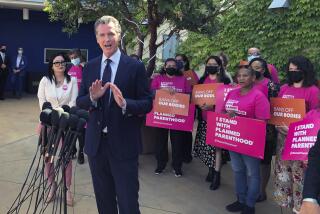Clinton Seeks Welfare Rules to Get Funds From Fathers
- Share via
WASHINGTON — With national welfare reform legislation deadlocked by partisan bickering, President Clinton on Tuesday announced plans to increase child-support collections and require more women who receive welfare to identify the fathers of their children.
The rules would force most women to help state authorities find the fathers of their children before the mothers could be considered eligible for federal welfare aid--a significant departure from current practice in many states. Clinton directed the Department of Health and Human Services to draft regulations that would more strictly define what information a woman must give about the identity of her child’s father.
The regulations also would clarify for states the circumstances, such as rape or potential abuse, that would excuse women from providing paternity information. But Clinton stopped short of dictating a limit to states on how many women could take such exemptions. Congressional Republicans have proposed cutting off federal aid to any state that waives the paternity identification requirement for more than 20% of its welfare recipients.
Currently, the fathers of about one-third of children receiving Aid to Families With Dependent Children remain unidentified by state authorities. That represents about 3 million children.
“Our system should say to mothers: ‘If you want our help, help us to locate and identify the father so he can be held accountable as well,’ ” Clinton told a convention of nurses in Washington. “It should say to fathers: ‘We’re not going to let you just walk away from your children and stick the taxpayers with the tab.’ ”
The president also offered federal assistance to states that already screen the names of new employees for those who owe child support. Under his plan, the 25 states that have in-state tracking systems would be able to submit names to a federal database, which could help identify deadbeat parents who have moved across state lines.
The Clinton administration said that the program could reduce spending on federal welfare programs by $1.1 billion over 10 years while increasing child-support collections by $6.4 billion.
The White House is eager to portray the president as implementing welfare reform, even as he blocks Republican reform efforts that he considers unfair to children. The substance of what Clinton proposed Tuesday had been a part of two separate welfare reform bills that he vetoed.
But with negotiations over subsequent legislation deadlocked, both critics and supporters of the president agreed that he needed to take some action to prevent being blamed for blocking welfare reform.
“President Clinton knows how powerful [a campaign] issue welfare reform can be, if he’s badly positioned, and this is a very big soft spot for the Clinton campaign,” said Brian Lunde, former executive director of the Democratic National Committee and a Democratic electoral strategist.
Neither of the president’s initiatives requires congressional approval. Indeed, some of his proposals already are being tried in the 13 states that have been granted federal waivers to try out new ways of establishing paternity.
Administration officials said the president’s proposals continue state-by-state welfare reform and circumvent the partisan wrangling that has stymied the national process.
Republican lawmakers agreed. But they suggested that Clinton’s opposition to GOP reform packages signified his unwillingness to dismantle the current welfare system.
“He’s signed some piecemeal things here,” said Rep. James M. Talent (R-Mo.). “But the heart of welfare reform is encouraging marriage and work and discouraging dependence and illegitimacy. . . . To do that he has to turn his back on the welfare state, which the modern Democratic Party erected. Nothing in this suggests he’s done that yet.”
More to Read
Get the L.A. Times Politics newsletter
Deeply reported insights into legislation, politics and policy from Sacramento, Washington and beyond. In your inbox twice per week.
You may occasionally receive promotional content from the Los Angeles Times.











